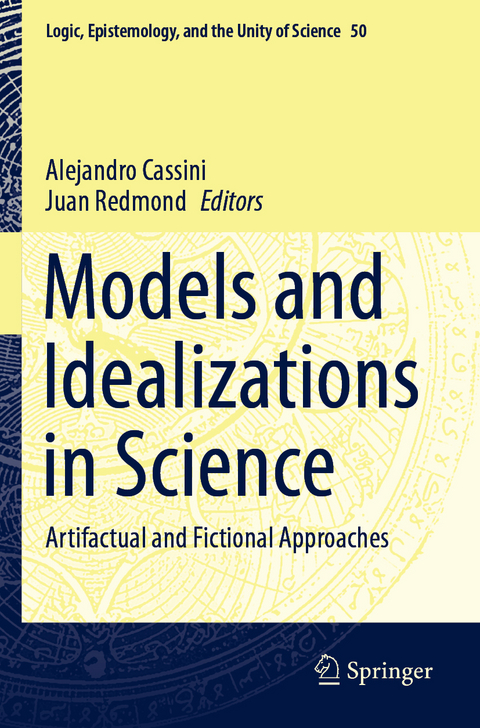
Models and Idealizations in Science
Springer International Publishing (Verlag)
978-3-030-65804-5 (ISBN)
This book provides both an introduction to the philosophy of scientific modeling and a contribution to the discussion and clarification of two recent philosophical conceptions of models: artifactualism and fictionalism. These can be viewed as different stances concerning the standard representationalist account of scientific models. By better understanding these two alternative views, readers will gain a deeper insight into what a model is as well as how models function in different sciences.
Fictionalism has been a traditional epistemological stance related to antirealist construals of laws and theories, such as instrumentalism and inferentialism. By contrast, the more recent fictional view of models holds that scientific models must be conceived of as the same kind of entities as literary characters and places. This approach is essentially an answer to the ontological question concerning the nature of models, which in principle is not incompatible with a representationalistaccount of the function of models.
The artifactual view of models is an approach according to which scientific models are epistemic artifacts, whose main function is not to represent the phenomena but rather to provide epistemic access to them. It can be conceived of as a non-representationalist and pragmatic account of modeling, which does not intend to focus on the ontology of models but rather on the ways they are built and used for different purposes.
The different essays address questions such as the artifactual view of idealization, the use of information theory to elucidate the concepts of abstraction and idealization, the deidealization of models, the nature of scientific fictions, the structural account of representation and the ontological status of structures, the role of surrogative reasoning with models, and the use of models for explaining and predicting physical phenomena.
lt;p>Alejandro Cassini received his PhD in Philosophy from Buenos Aires University in 1990. He has been Visiting Scholar at Columbia University from 1998 to 2001. He presently is Regular Professor at the Philosophy Department of Buenos Aires University, where he teaches History and Philosophy of Science. He works as Senior Researcher at the Conicet (Argentina), where he leads a research group in the History and Philosophy of Physics.
Juan Redmond is full professor at the Universidad de Valparaíso, Institute oh Philosophy and research fellow at the Conicyt (Chile). He graduated in Philosophy at the University of Cuyo (Argentina), gathered a Master in Literature at the Faculty of Etudes Romanes by the Université de Lille (France), with a dissertation titled Fictions in the work of Jorge Luis Borges: for an artefactual approach, and a PhD in 2010 in Philosophy, at the University of Lille 3 (France), with a dissertation on a Dialogical logic of fictions.
Chapter 1. Introduction: Theories, Models, and Scientific Representations (Alejandro Cassini and Juan Redmond).- Chapter 2. An Artifactual Perspective on Idealization: Constant Capacitance and the Hodgkin and Huxley Model (Natalia Carrillo and Tarja Knuuttila).- Chapter 3. Informative Models: Idealization and Abstraction (Mauricio Suárez and Agnes Bolinska).- Chapter 4. Deidealized Models (Alejandro Cassini).- Chapter 5. Scientific Representation as Ensemble-Plus-Sanding-for: A Moderate Fictionalist Account (José A. Díez).- Chapter 6. Seven Myths About the Fiction View of Models (Roman Frigg and James Nguyen).- Chapter 7. Bridging the Gap: The Artefactual View Meets the Fiction View of Models (Fiora Salis).- Chapter 8. Models as Hypostatizations: The Case of Supervaluationism in Semantics (Manuel García-Carpintero).- Chapter 9. Structural Representation and the Ontology of Models (Otávio Bueno).- Chapter 10. Representation and Surrogate Reasoning: A Proposal from Dialogical Pragmatism (Juan Redmond).- Chapter 11. Prediction and Explanation by Theoretical Models:An Instrumentalist Stance (Andrés Rivadulla).- Chapter 12. Commented Bibliography on Models and Idealizations (Alejandro Cassini).- Name Index.- Subject Index.-
| Erscheinungsdatum | 31.05.2022 |
|---|---|
| Reihe/Serie | Logic, Epistemology, and the Unity of Science |
| Zusatzinfo | XV, 270 p. 9 illus. |
| Verlagsort | Cham |
| Sprache | englisch |
| Maße | 155 x 235 mm |
| Gewicht | 444 g |
| Themenwelt | Geisteswissenschaften ► Philosophie ► Erkenntnistheorie / Wissenschaftstheorie |
| Geisteswissenschaften ► Philosophie ► Philosophie der Neuzeit | |
| Naturwissenschaften | |
| Schlagworte | abstract objects • An Artifactual Approach to Modeling • artefacts • artifactualism • Fictionalism • fictionalism and artifactualism • Fictional Models • Fiction View of Models • Idealization and Modeling • Idealizations in Science • Idealized Models • Idealized Representations • Informative Models • Models Building • models function in different sciences • non-representationist views of scientific models • traditional antirealist construals of scientific laws • types of non-representationist views of scientific models |
| ISBN-10 | 3-030-65804-X / 303065804X |
| ISBN-13 | 978-3-030-65804-5 / 9783030658045 |
| Zustand | Neuware |
| Informationen gemäß Produktsicherheitsverordnung (GPSR) | |
| Haben Sie eine Frage zum Produkt? |
aus dem Bereich

![Was heißt Denken?. Vorlesung Wintersemester 1951/52. [Was bedeutet das alles?] - Martin Heidegger](/media/113619842)
